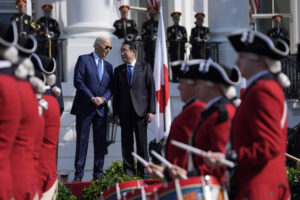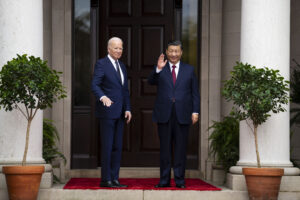Pence Outlines Plan for New Space Force by 2020
The vice president says the creation of a sixth, separate military service will fulfill President Trump's vow to assure U.S. dominance in space.WASHINGTON—Faced with growing competition and threats from Russia and China, the White House on Thursday said it will create the U.S. Space Force as a sixth, separate military service by 2020.
Vice President Mike Pence told a Pentagon audience that the plan fulfills President Donald Trump’s vow to ensure America’s dominance in space — a domain that was once peaceful and uncontested that has now become crowded and adversarial.
“Now the time has come to write the next great chapter in the history of our armed forces, to prepare for the next battlefield where America’s best and bravest will be called to deter and defeat a new generation of threats to our people, to our nation,” said Pence. “The time has come to establish the United States Space Force.”
Trump marked Pence’s announcement with a tweet: “Space Force all the way!”
Trump has called for a “separate but equal” space force, a complicated and expensive move that requires congressional approval. On Thursday, Pence said that the administration will work with Congress on the plan, and will outline a budget next year.
Defense Secretary Jim Mattis has endorsed steps to reorganize the military’s space warfighting forces and create a new command, but has previously opposed launching a pricey, new service. A new branch of the military would require layers of bureaucracy, military and civilian leaders, uniforms, equipment and an expansive support structure.
The Pentagon proposal delivered to Congress Thursday lays out plans to consolidate the Pentagon’s warfighting space forces and make organizational changes to boost the acquisition and development of leading-edge technologies.
The Pentagon’s role in space has been under scrutiny because of a recognition that the United States is increasingly reliant on satellites that are difficult to protect in space. Satellites provide communications, navigation, intelligence and other services vital to the military and the economy.
The U.S. intelligence agencies reported earlier this year that Russia and China are pursuing “nondestructive and destructive” anti-satellite weapons for use during a future war. And there are growing worries about cyberattacks that could target satellite technology, potentially leaving troops in combat without electronic communications or navigation abilities.
Your support matters…Independent journalism is under threat and overshadowed by heavily funded mainstream media.
You can help level the playing field. Become a member.
Your tax-deductible contribution keeps us digging beneath the headlines to give you thought-provoking, investigative reporting and analysis that unearths what's really happening- without compromise.
Give today to support our courageous, independent journalists.






You need to be a supporter to comment.
There are currently no responses to this article.
Be the first to respond.